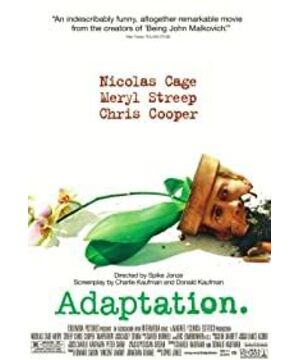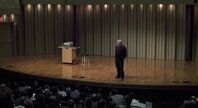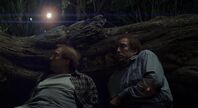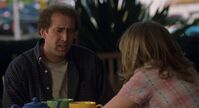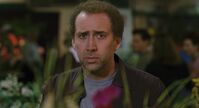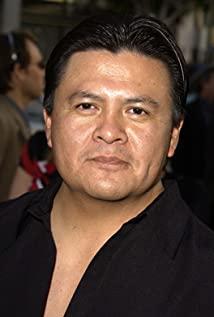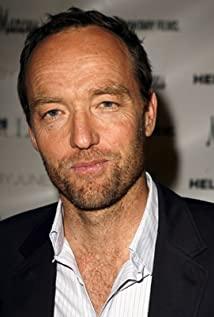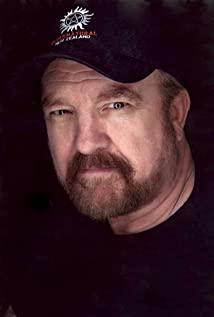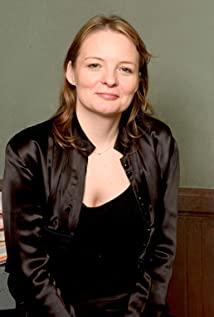The first scene of the film is the scene of the filming, and it is very realistic. This scene on the set couldn’t be better for highlighting the realism and authenticity of the protagonist’s image. (Celebrity cameo effect, to stimulate the audience's interest in watching the film.)
The second act of the film very unexpectedly becomes a brief history of the earth. This part completely allows the audience to enter the imagination space of the protagonist. With the rapid advancement of the movie screen, we reviewed the history of the earth's development. Among them, the most shocking scenes are the images of natural births and caesarean sections. How can these two appear in the movie casually? (This kind of hysterical imagination quickly convinced the audience that this was definitely not a regular film, and the point of interest increased again.)
The third act of the film is a two-shot cut combination. The protagonist's pathetic presentation is no doubt, though, he managed to secure a script contract with his lame push and sincere performance. (After eliminating the audience's regular viewing needs, the midway transition will not make the audience boring and make the movie more compact.)
The fourth act of the movie continues to deepen with the information provided by the protagonist. We see the heroine and the writing activity she is working on. (The film uses time stamps to avoid audience confusion, and the footage is concise.)
The fifth act of the film goes a step further with the information provided by the heroine. From the city to the jungle, the orchid thief and the movie's non-human protagonist "Ghost Orchid" appeared. (Up to this point in the movie, the audience is still dragged into the film’s stream of consciousness shooting style, and each scene is not explained clearly or completely. The audience seems to be watching a suspense movie, and their eyes cannot be taken away.)
The first part of the movie The six acts return to the time horizon of the first act. As the protagonist's life unfolds, his twin brother appears. Learned some information about the movie script through the interesting conversation between them. (Once again, one of the film's highlights—one person in two roles—continues to inspire audiences to enjoy it.)
In the seventh act of the film, the protagonist's girlfriend appears. However, the tragic nature of the protagonist has not improved, and he is still sad again. (This part is still only a little bit of a foreshadowing. The film avoids being too entangled in a certain matter and shows a good ability to control the audience's attention.)
... The
whole film is composed of such scenes of stream of consciousness, It is composed of frequent and clever monologues, dialogues of different styles, and layers of mist. The first half of the film has been entangled in the protagonist's predicament, that is, picking a difficult script task but unable to complete it. Until he found Darwin and conceived the evolution of all things, it naturally corresponds to the second act at the beginning of the movie. It was at this time that the audience first learned that the script written by the original protagonist is the script of the movie we are watching now! But because the script isn't finished, we don't know how the movie will play out next; or because the movie isn't finished yet, we don't know how the script ends. Officially from this moment on, the most daring movie I've ever seen - it's a movie about its script! What's more, its script is the script written by the protagonist of the film (almost at the same time as we watch the movie)!
Next, in addition to enjoying its entertainment spirit, accepting its emotional resonance, appreciating its shooting skills, and absorbing its intellectual inspiration, the audience's task is to participate in the process of its creation and presentation.
When it comes to its entertaining spirit, it's a kaleidoscope of content. Among them, the protagonist's sexual fantasy and masturbation ability are of course superior, and the personalities of other characters are also very prominent. We can always see some humor and drama in the process of watching a movie. There are a lot of psychological and emotional portrayals in the movie, which are also quite consistent with our own experiences. Especially for the key characterization of some scenes, it reflects the composition and capture ability of the director's genius.
Throughout the film, its center of gravity has been in uncertainty and constant change. Its protagonist is the hero, but the hero of the hero's script is the heroine, but since his script is the script of the film we have seen, its hero cannot be the heroine. This paradox makes our male protagonist feel like he's crazy, "fat and pathetic."
Contradiction is the price of wisdom. It is precisely because of this contradiction that the film's wisdom is superior to other films.
In the second half of the film, with the pursuit of the heroine by the heroine for the needs of script writing, the film has evolved from a film about orchids positioned by the hero and the film producer at the beginning, into a film about orchids. This is a "standard" movie full of vivid, intricate plots with the hero himself as the main line and the heroine, Orchid, his brother, the orchid thief, etc. as auxiliary lines.
The ending of the movie, just like the inspiration of the script master to the hero in the movie, a wonderful ending saves the movie that looked wild at first, then looked unique, and then seemed irreversible. Sex, drugs, guns, car chases, good guys die, bad guys get caught, the protagonist starts a new life after being reborn… it all seems very real too. Although the script writers of the movie began to distance themselves from these Hollywood movies, its true ending is all-encompassing and all-encompassing.
- full of irony. Like the old mage in the movie said, rules and principles are different. The film doesn't play by the rules (single narrative level), but it follows the principles (full of dramatic conflict). This is one of its achievements.
Another crowning achievement is its refined and vulgar movie lines and sophisticated and unique movie language, as well as their combined revealing of many aspects of human nature. Life is movement and change is eternal. The level of detail in life contains a lot of subtle emotions. So everyone is so unique. However, getting along is not easy.
In the end we all can't help hurting each other, even with so much love and appreciation out there.
View more about Adaptation. reviews


